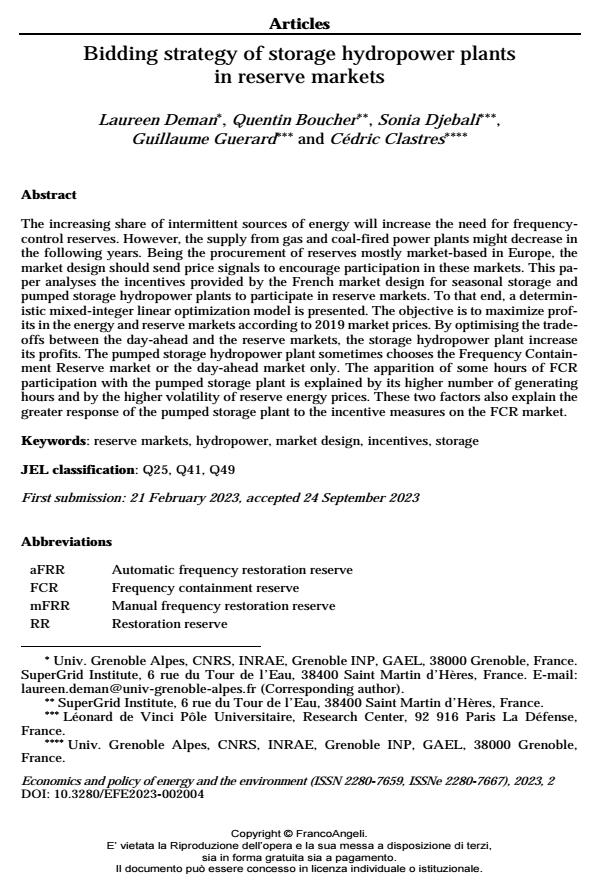Bidding strategy of storage hydropower plants in reserve markets
Titolo Rivista ECONOMICS AND POLICY OF ENERGY AND THE ENVIRONMENT
Autori/Curatori Laureen Deman, Quentin Boucher, Sonia Djebali, Guillaume Guerard, Cédric Clastres
Anno di pubblicazione 2023 Fascicolo 2023/2
Lingua Inglese Numero pagine 25 P. 77-101 Dimensione file 558 KB
DOI 10.3280/EFE2023-002004
Il DOI è il codice a barre della proprietà intellettuale: per saperne di più
clicca qui
Qui sotto puoi vedere in anteprima la prima pagina di questo articolo.
Se questo articolo ti interessa, lo puoi acquistare (e scaricare in formato pdf) seguendo le facili indicazioni per acquistare il download credit. Acquista Download Credits per scaricare questo Articolo in formato PDF

FrancoAngeli è membro della Publishers International Linking Association, Inc (PILA), associazione indipendente e non profit per facilitare (attraverso i servizi tecnologici implementati da CrossRef.org) l’accesso degli studiosi ai contenuti digitali nelle pubblicazioni professionali e scientifiche.
The increasing share of intermittent sources of energy will increase the need for frequency-control reserves. However, the supply from gas and coal-fired power plants might decrease in the following years. Being the procurement of reserves mostly market-based in Europe, the market design should send price signals to encourage participation in these markets. This pa-per analyses the incentives provided by the French market design for seasonal storage and pumped storage hydropower plants to participate in reserve markets. To that end, a determinis-tic mixed-integer linear optimization model is presented. The objective is to maximize profits in the energy and reserve markets according to 2019 market prices. By optimising the trade-offs between the day-ahead and the reserve markets, the storage hydropower plant increase its profits. The pumped storage hydropower plant sometimes chooses the Frequency Contain-ment Reserve market or the day-ahead market only. The apparition of some hours of FCR par-ticipation with the pumped storage plant is explained by its higher number of generating hours and by the higher volatility of reserve energy prices. These two factors also explain the greater response of the pumped storage plant to the incentive measures on the FCR market.
Parole chiave:reserve markets, hydropower, market design, incentives, storage
Jel codes:Q25, Q41, Q49
Laureen Deman, Quentin Boucher, Sonia Djebali, Guillaume Guerard, Cédric Clastres, Bidding strategy of storage hydropower plants in reserve markets in "ECONOMICS AND POLICY OF ENERGY AND THE ENVIRONMENT" 2/2023, pp 77-101, DOI: 10.3280/EFE2023-002004